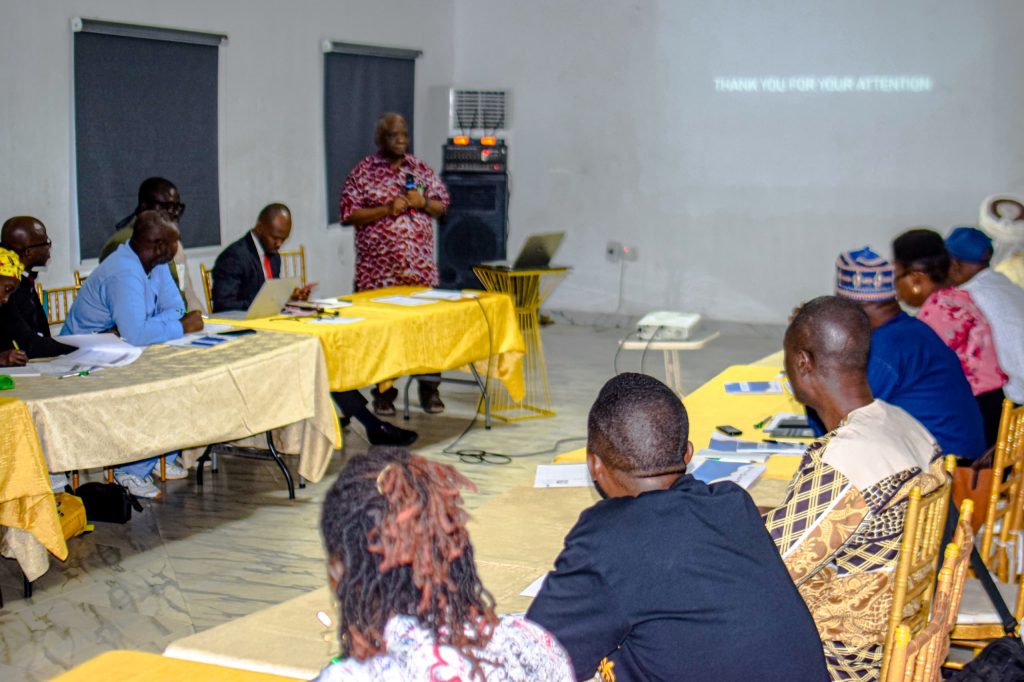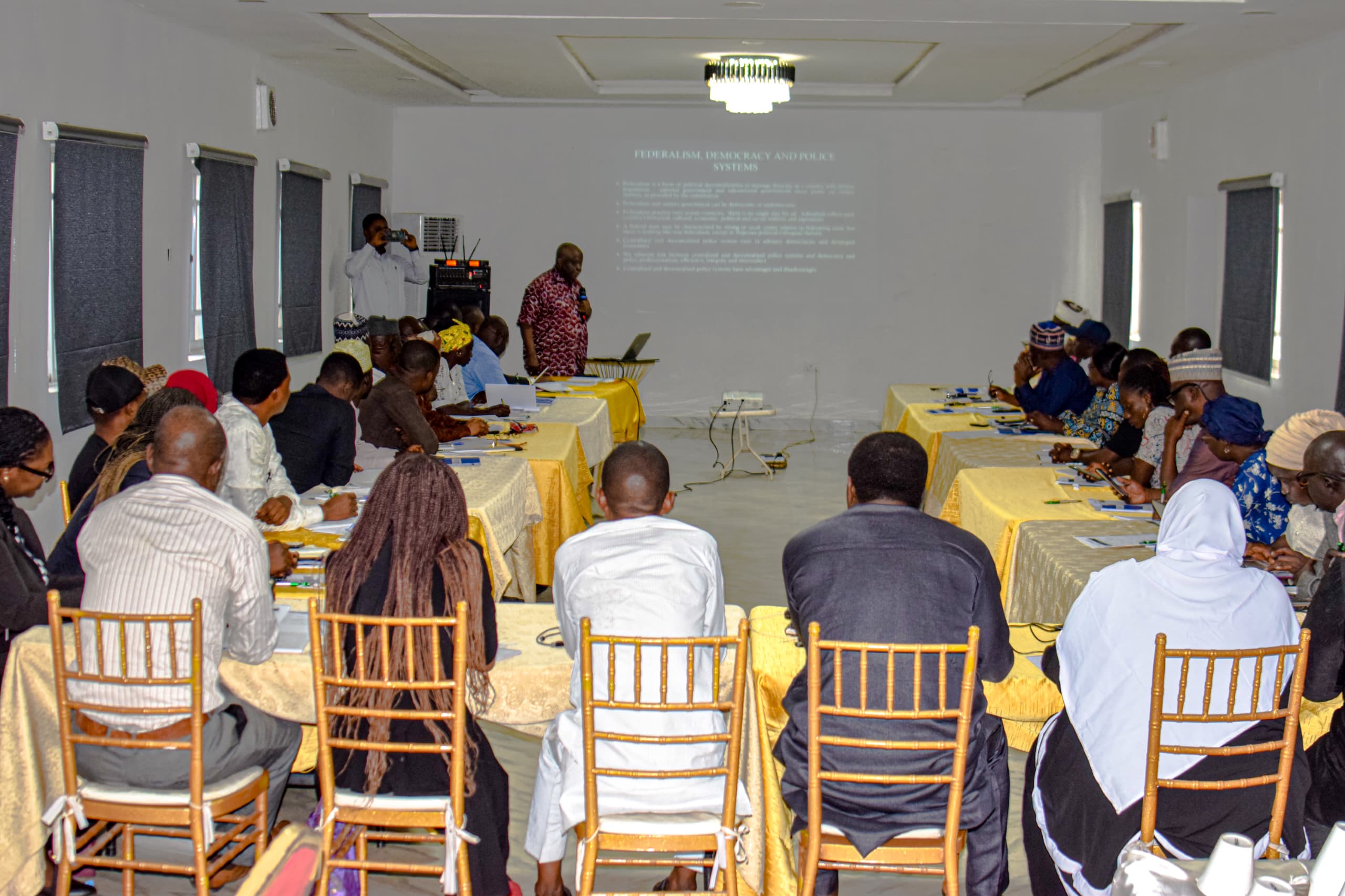…holds citizens engagement on Police reform in Nigeria

A Non-Governmental Organization, Centre for Law Enforcement Education of Nigeria (CLEEN) Foundation has called for strong synergy between the Nigeria Police Force and members of the public in order to forge partnerships built on trust and mutual respect for effective community policing and human rights protection.
The Acting Executive Director for the CLEEN Foundation, Mr Peter Maduoma, made the call at a 2-day Workshop on Citizens Engagement on Police Reform in Nigeria-North Central held at G-Pinnacle Suits, Ilorin, the Kwara State capital.
The workshop had relevant stakeholders in attendance including the Kwara State Commissioner of Police, CP Victor Olaiya; Baba Isale of Ilorin, Alhaji Abdullahi Sidiq Baba-Ile Apa;
National President of Ilorin Emirate Descendants Progressive Union (IEDPU), Alhaji Abdulmumin Ayo Abdulmalik; National Secretary of IEDPU, Mallam Abubakar Imam; Chairman of Community Policing Committee, Alhaji Abdullahi Jubril Yusuf; representatives of the National Human Rights Commission, Legal Aid Council, Ministry of Justice, Civil Society Organizations among others.
Tagged “Citizens’ Engagement on Police Reform in Nigeria, North Central zone”, the workshop was organized by the CLEEN Foundation with the support of the United Nations Development Programme (UNDP).
The Acting Executive Director for CLEEN Foundation, Mr Peter Maduoma, said the workshop centered on a mission that lies at the heart of a safer and more harmonious society—strengthening the relationship between the police and the communities they serve.
“We are here today because of the shared belief that a strong partnership between law enforcement and the public is fundamental to enhancing public safety and fostering an environment where both citizens and police can work together effectively.
He added that when communities and police engage in meaningful conversations and forge partnerships built on trust and mutual respect, it leads to a strong foundation for improved security, safety and peace.
“This meeting is an opportunity to strengthen those vital conversations between the police and the public. Through open dialogue, we can bridge gaps, address concerns, and work together to identify the specific needs and challenges that each community faces.
“Today’s discussions are a chance for both sides to come together in an open forum, enhancing mutual understanding and promoting cooperation.With support from UNDP, CLEEN Foundation remains committed to supporting initiatives that promote such critical dialogue.
“We believe that ongoing engagement between the police and citizens is key to achieving a balanced, just, and effective security framework. Our goal is to foster an environment where both parties feel heard, understood, and empowered to act together in the best interests of public safety.
“It is imperative to mention that we have had similar engagements in Borno and Imo states and we would continue in other states after this engagement here in Kwara state. From these previous engagements, we have learnt that the engagements of this nature cannot be overemphasized.
“Therefore, we are convinced that this engagement will greatly contribute to public safety and security in this state even as we deliberate on the critical importance of police-public engagement”.
In his paper presentation on the theme of the workshop, “Policing and Police Reform In Nigeria” a renowned Sociologist, Professor Etannibi Alemika, noted that policing is everyone’s responsibility.
“Policing begins with everyone of us, we all have a responsibility to protect our properties, lives, and communities.
“Pre-colonial African societies employed different mechanisms for policing. Prior to colonial rule, residents of African villages and towns bore responsibilities for policing and safeguarding their community from criminals within and invaders from outside.
“Most had no formal police employees but depended on an array of groups for policing amongst which were elders, priests, diviners, age-grades/age sets, and hunters. Policing was carried out along with “regular jobs as farming, trading, fishing, weaving, smithery and the like.
“Colonial rulers undermined these traditional policing actors and mechanisms. It introduced a Western-type policing system, which forms the bedrock of the contemporary government policing system in the country.
“The colonial and western forms of police forces established in the country have failed to serve the citizens efficiently and satisfactorily.”
Highlighting some of the challenges and constraints of the Nigeria Police Force, he said “the Nigeria Police Force faces several critical challenges that undermine its effectiveness and legitimacy.
“The fundamental structural challenges include neglect during military rule, lack of goodwill by the government to maintain a capable police force to respond to socio-economic and political changes, worsening socio-political and economic conditions that aggravate criminality, disorder and violent enterprises.
“The organizational challenges and constraints include lack of capacity to gather, analyze, and use intelligence for crime prevention and control; poor remuneration and general conditions of service; inadequate training; poor resource management by the leadership; inadequate equipment, including arms and ammunition, uniforms, and accouterments; insufficient telecommunication and transportation facilities in terms of both quality and quantity; limited contacts or hostile relationships with the general public; poor knowledge of the law; and disregard for human rights.”
Prof Etannibi, who has served as a member of many Police reforms in the past said as part of the solutions the vision, mission, mandate, value, and operations, the Police should be consistent with democratic culture and governance.
He also stated that the policing reforms will not guarantee security and development without good governance, efficient public service delivery of essential services as well as opportunity for meaningful employment and income, social recognition, equality and justice, social protection from deprivations.
In his remarks, Commissioner of Police, CP Victor Olaiya also lamented the cost implication of running an efficient and effective police, saying fueling patrol vehicles and carrying out good investigations is a major challenge.
The police boss, commended the people behind the workshop, affirming that the initiative had brought some positive changes to the Police Force in the past, such as the National Health Insurance Scheme (NHIS) and the Police Trust Fund.
“NHIS and PTF are a great plus to the personnel of Nigeria Police Force and I want to believe this workshop will also come up with a good recommendation that will further strengthen the agency and push for implementation of those recommendations at the appropriate quarters,” he said.
Charter of demands and recommendations adopted at the end of the workshop reads in parts:
“Transparency and Accountability; Establish clear, community-driven police recruitment processes. Implement robust mechanisms for reporting and investigating police misconduct. Ensure independent review processes for police conduct and performance.
“Structural and Operational Reforms; Decentralize policing structures to increase responsiveness to local needs.
Leverage technology and innovations like CCTV, biometrics, and data analytics to enhance police effectiveness.
“Eradication of Corruption; Instill a culture of integrity, ethics, and zero-tolerance for bribery and misconduct. Ensure security of tenure and autonomy for police leadership to reduce undue political interference.
“Resource Allocation and Utilization; Increase budgetary allocations for the police and ensure efficient, transparent use of funds. Provide police personnel with necessary tools, equipment, and logistical support to carry out their duties effectively”.
The group, further presented its recommendations (Communique) to the Inspector General of Police (IGP) Kayode Egbetokun through Kwara State Commissioner, Victor Olaiya and stated that implementing the recommendations holistically would help transform the Nigerian police force into a more professional, ethical, and citizen-centric institution.


Leave a Reply